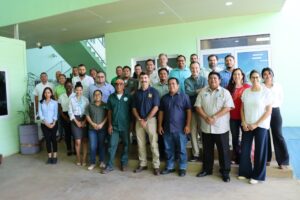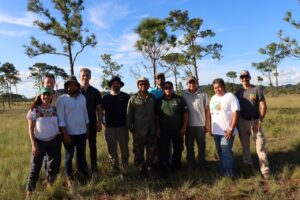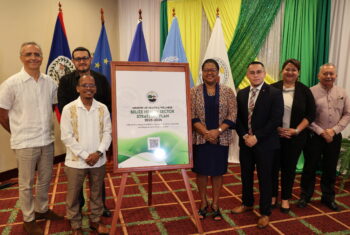Belmopan, October 10, 2023.
The Ministry of Economic Development and the Belize Forest Department are hosting the International Savanna Fire Management Initiative (ISFMI) on a visit to Belize as part of the Green Climate Fund (GCF) readiness project “Traditional Savanna Fire Management Readiness Proposal to facilitate Emissions Reductions in the Agriculture, Forestry, and Other Land Use (AFOLU) Sector in Belize.”
Today, a project inception workshop was held at the Ministry of Sustainable Development with ISFMI and key stakeholders, including representatives from the government, the Southern and Central Belize Fire Working groups, academia, the private sector and communities.
academia, the private sector and communities.
During his opening remarks, Mr. Carlos Pol, Director of the Climate Finance Unit, noted that strengthening forest fire management and partnerships with local communities is a priority for the Ministry of Economic Development. Mr. Wilbur Sabido, Chief Forest Officer at the Belize Forest Department, noted that climate change is expected to exacerbate late dry season wildfires in the region, further increasing the importance of employing approaches that reduce the risk of dry season wildfires.
Mr. Sam Johnston, Director of ISFMI, shared that fire is a worldwide problem and that all countries share a similar history of fire management and mismanagement. He said that Australia’s experience has shown the solution to this threat. Shifting fire patterns from the late to the early dry season, alongside a community development-based approach, countries can reduce emissions from fire by up to half while supporting adaptation to climate change, preventing forest loss and degradation, protecting biodiversity and creating employment, community income and other co-benefits in remote indigenous communities. Mr. Johnston highlighted that given the similarity of histories, landscapes and fire regimes, ISFMI is confident that adopting these techniques would produce similar outcomes in Belize.
Mr. Mario Muschamp, Terrestrial Manager at Toledo Institute for Development and Environment, said it was time for Belize to see the good face of fire by using fire in the right way to conserve biodiversity, soils and engage and proactively support communities.
During the next several days, there will be technical workshops on monitoring,  reporting and verification, roundtable consultations and site visits to Southern Belize to continue to develop and strengthen fire management in Belize. Representatives from the government, ISFMI, communities, research institutions, companies, and others interested in fire management will participate. The aim is to share knowledge, increase coordination on fire management, build capacity and identify the key challenges and opportunities to improve fire management in Belize.
reporting and verification, roundtable consultations and site visits to Southern Belize to continue to develop and strengthen fire management in Belize. Representatives from the government, ISFMI, communities, research institutions, companies, and others interested in fire management will participate. The aim is to share knowledge, increase coordination on fire management, build capacity and identify the key challenges and opportunities to improve fire management in Belize.
The goal of the GCF readiness project is to conduct baseline scientific assessment, consultations, gap analysis and capacity building to develop a concept note that will lead to self-sustaining fire management projects that reduce wildfires and GHG emissions, protect biodiversity, prevent forest loss and degradation and create opportunities for local communities.
Dr. Osmond Martinez, CEO in the Ministry of Economic Development and the National Designated Authority for the GCF, shared that the ministry anticipates a successful mission and further collaboration with ISFMI to access the necessary technical and financial support for the fire management initiative in Belize.
Ends
For more information, please contact:
Mr. Leroy Martinez
Economist & GCF Focal Point
Ministry of Economic Development

